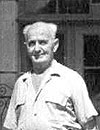
|
Ya’acov Berkovitch
|
 |
Ya’acov was born in Lachovitch, a small town in Russia in which many Jewish families lived. Five members of the family made aliyah and three of them came to Degania – Ya’acov, Chaim and Tsippora. In Russia Ya’acov had been a yeshiva student, but when he came to Israel he became a farmer and joined the pioneers at Um Juni.
He adapted with ease to the work of the field and his adeptness at work was well known. The members said of him: “the spade makes music in his hands.”
During the days of the First World War, after the “Nili” spy ring had been uncovered, the Turks arrested many members of the community and sent them to prison in Damascus, with Ya’acov among them. Upon his return from prison, he readjusted to work and to social life. He was a central figure in the group, active on committees and always a participant at kibbutz meetings. He expressed himself well in writing, and his articles were published in the Degania newsletters. Dina Barhon writes of him: “Just as I learned the rules of work from him, for me he served as an example in everyday life, - in the modesty of his attire and his personal needs, in the simplicity of his life and the pleasantness of his ways, in his modesty and generosity of heart.
He was a man of the book. He read much and was aware of what was happening in the country and within the movement.
He married Miriam Zinger, a writer and poetess. Miriam was from Czechoslovakia and it was apparent that she came from a different background. Their sons, Eliezer (Zayze) and Chen, were born in Degania.
In 1945, when a group of children from Syria arrived, Ya’acov and Miraim received ten year old Eenie (Yitzhak Abadi) into the bosom of their family. Very special ties were formed between Ya’acov and Eenie. Ya’acov saw in him the continuation of his path in agriculture and his love of Degania.
He worked in the field for many years – in fodder and in field crops. For reasons of health he left the work in the field and became a night watchman. He was the “night king” of Degania.
Ya’acov saw in work the central value of the life of the kibbutz and he expressed this on many occasions. Among the things he said at the kibbutz meetings: “The day to day cooperative work brings closer those who are distant in spirit. I would like to dwell on one thing. I always think of the material as well as the spirit and we need to attach all the life of the spirit to materialistic Zionism as well as to the group. My opinion is that should Degania become an industrial enterprise, by establishing a factory for example, it would be proper that she relinquish part of her land to another group. As long as we have not adopted the ideology of a larger group than ours, that we have an ideal, life has to be a means. We have to live by work. Only what the work brings in can we spend.”
Ya’acov lived by his principles. He was among the builders of Degania and the kibbutz movement.
He died after a prolonged illness, at the age of 81. He left his wife Miriam, his sons Eliezer and Chen, and Chen’s family.
May his memory be blessed.
 |

